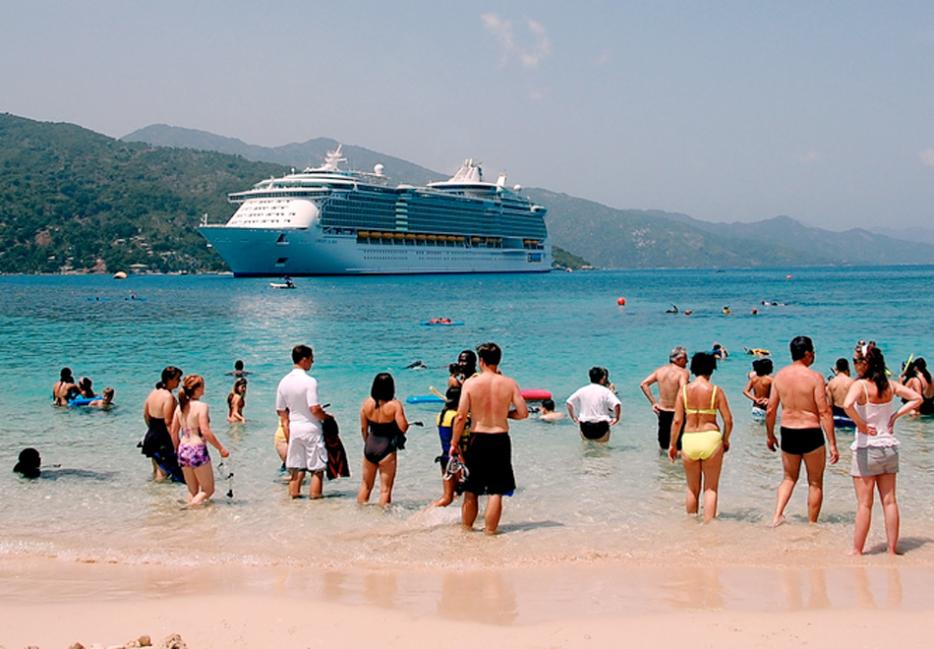Haiti's had many problems over the centuries, but only a few have actually been Haitian.
And now, as the millions invested and billions promised after the 2010 earthquake have reconstituted the nation once again, Haiti's citizens look like they're turning to tourism to help them out of the pit of despond into which foreign aid has unwittingly plunged them.
It's a question of vital importance not only to Haitians, but to any number of regions and nations with valuable natural resources of the touristic variety that remain unexploited due to lack of infrastructure, general poverty, corruption, or any of the ills that plague some of the world's most beautiful places. In a way, Haiti is a perfect test case: It's in the Caribbean, which is already internationally known and attractive; it's just off the coast of one of the biggest sources of tourists on the planet; and it's got a history of tourism to draw on, both culturally and infrastructurally. If Haiti can pull it off, if it figures out how to make tourism work for rather than against it, other traditionally tourist-free zones such as Armenia, Bosnia and Herzegovina, Burundi, Georgia, Kyrgyz Republic, Laos, Liberia, Rwanda, Serbia, and Zambia may be able to use their playbook.
So the minister of tourism, Stéphanie Villedrouin, is launching an assault. In May, she got $45 million from the World Bank to invest in tourism. That same month, American Airlines announced it would be flying into Port-au-Prince. There's an Occidental hotel—the Royal Oasis—and a Best Western in Pétionville, a suburb of the capital, both of which opened about a year and a half ago. A Marriott's coming, and the Punta Cana Group from the Dominican Republic next door has announced its plans to invest $200 million in the country.
But Canada's been on the case for a while longer. About two years ago, Air Transat became the first company in decades to offer package tours to Haiti, leaving once a month from Montreal (the fact that one of the buyers for the company is Villedrouin's sister didn't hurt). At around the same time, the Inter-American Development Bank (IDB) got in touch with Toronto-based G Adventures to help them look into the suitability of Haiti for tourism development. They both had tried the year before, just a few months after the earthquake, and had decided that things were still too much of a mess. But things have changed, and as a result of the study, the IDB is investing in the south of the country, and G Adventures has just announced that it has added eight departures for 2015, taking up to 16 travellers each through Haiti. G is a leader in sustainable, grass-roots travel. Where they go, others tend to follow. It's a very good sign.
(There's also a good travel guide, published by Bradt and written by Paul Clammer, a man who keeps on top of Haitian issues, even between editions, and who has pointed me at several of the items in this piece.)
And as the hotels and discounted flights arrive, so too do the journalists and travel writers, the shock troops to tell their various national readers about whether they should follow, and what they'll see if they do—Der Spiegel journalist Samiha Shafy among them:
“[T]he hotel owner takes the group out to a reef in a speedboat, and they splash around in the water and drink chilled fruit punch. And then, just once during their tour, the two Haitis collide.... A fisherman in a dilapidated little boat paddles up to the group. He looks like the old man in Hemingway novel: toothless and with leathery skin, calloused hands and cracked fingernails. He says nothing. He merely gazes in astonishment at the scene and waits. The group on the speedboat looks down at the fisherman, equally astonished.”
The fisherman never said a word. How did the writer know he was astonished by the sight of French writers in a boat with fruit juice? She knew because he was Haitian, and old, and probably poor—he had leathery skin, after all—how could he not be astonished? What could he know of leisure? Of cold fruit juice?
This is, of course, just one moment from an otherwise substantial article considering two points of view on what Haiti should be doing now. One is from a lawyer, Mario Joseph, and the other from Villedrouin. The lawyer thinks the focus must be on justice for Haitians, not money from foreigners. But this is the climax, the moment to which the article builds. This is the takeaway, and it's an irresponsible one.
Haitians are not astonished by wealth, or foreigners, any more than anyone else is, outside of an uncontacted tribe or two in South America or Papua New Guinea. We could indulge in a little critical theory terminology and say that she's reifying the man, making him the “other,” and, in the process, creating a distance between object and subject, hardening the colonialist gaze into a post-colonial sympathetic fallacy that is at least as problematic. We could then use problematic as a noun. Or we could just say Shafy is peddling bullshit. Our fisherman may want some money, but he's not dumbfounded by it.
I rant out of love. Not for Shafy, but for tourism, and even travel writing.
I rant, too, because Haiti's at one of the most important junctures in its history. It used to have a tourism industry, one that favoured the milâte, or mulattoes, who still control much of the country's wealth (and own, among other things, the new Best Western). The money didn't circulate as much as it might have, but at least there was money, and jobs. Aid has crippled Haiti as much as it's helped it, and the nation is of course right to try to wean itself from its scabrous teat. But tourism can do wrong, and all Haiti has to do is look east, to the other two-thirds of the island of Hispaniola known as the Dominican Republic, to see how.
Despite millions of tourists a year, hundreds of thousands of whom are Canadian, the average Dominican lives on less than $4 a day. Tourism is resort- and cruise-based, the two forms of tourism that most resemble the parasites tourists are forever in fear of picking up in such places. Owned by foreign concerns, paying minimal fees and taxes because of the supposed boon they bring to an otherwise impoverished nation, they do little, and take much. Their business models are focused on retaining as much of the money tourists spend for themselves as possible, offering free food to discourage people from eating local, free drinks to make sure no one goes out to bars, private beaches and pools to make sure local businesses that might spring up along some of the world's most attractive coastlines don't.
Now, as it happens, the Punta Cana Group—the one looking to invest $200 million in 3,000 hotel rooms and a private airport—was founded by a Dominican native and a pretty darn socially responsible New York labour lawyer named Theodore Kheel. But they would seem to be the exception, rather than the rule. Puerta Plata, the capital and the first area to receive international tourist attention in the 1970s, is dominated by Ocean World (owned by Bavarian Ludwig Meister), Riu hotels (founded and based in Mallorca, Spain), Iberostar (ditto), and other companies from richer countries. Billions of dollars come into the still poor nation every year, but almost all of it bounces right off again. This is, historically, what happens to poor nations when they get suddenly popular. Unable to take advantage of the opportunities themselves, they invite a new set of problems, almost certainly ensuring they'll never be masters in their own lands, doomed to forever play the Transylvanian peasants to the foreign corporate vampires.
It would be a shame if Villedrouin let the wrong ones in. And there are early indications that not everything is going especially well. I visited Haiti, and stopped by Ile-a-Vache a couple of years ago. The location is great—an island off the southwest coast of Haiti—but much of the turf is inhabited and messy, as inhabited places often are. It seems as if, at least on this small island, the Haitian government has decided to put tourism before the people. It's a mistake, even on a small scale. Let's hope it's an uncharacteristic one. Because if she does things right, if the almost unbroken string of incompetent, corrupt, and evil leaders has given way to at least a couple of decent ones, some very good things could happen to this country, which has been in need of some very good things for a long time.
And there are so many ways to do it right. Micro-investing—investment schemes operated along the same lines as micro-lending—could allow a broad range of people to benefit from any prosperity tourism may bring. Using some of that $45 million to assist locals—and not just the already wealthy, light-skinned locals—in setting up shop. Ensuring that the already independently owned hotels along the gorgeous Côte des Arcadins stay that way. Encourage foreign investment from companies like Best Western—a non-profit co-operative that assists locals in opening and operating properties—rather than even one of those bland Spanish resorts. They could highlight the cuisine, which is unique and outshines the rest of the Caribbean by leagues, and other specifically local things while, of course, tempting internationals with the beaches and the warmth and the tropical fruits and the astonishing juices that come from them.
Air Canada already flies there, and has done so for a long time. And two Haitian airlines, Sunrise and Tortug'Air, have announced intra-Caribbean route expansions. It seems certain that more people will be landing in Haiti. But the question of where the money will go—and whether it will do more good than the aid dollars have, offering Haitians the autonomy they fought so hard and so well for 200 years ago—remains to be answered. That fisherman may not be astonished by tourists, but let's not give him a reason to be pissed off at us, either.






